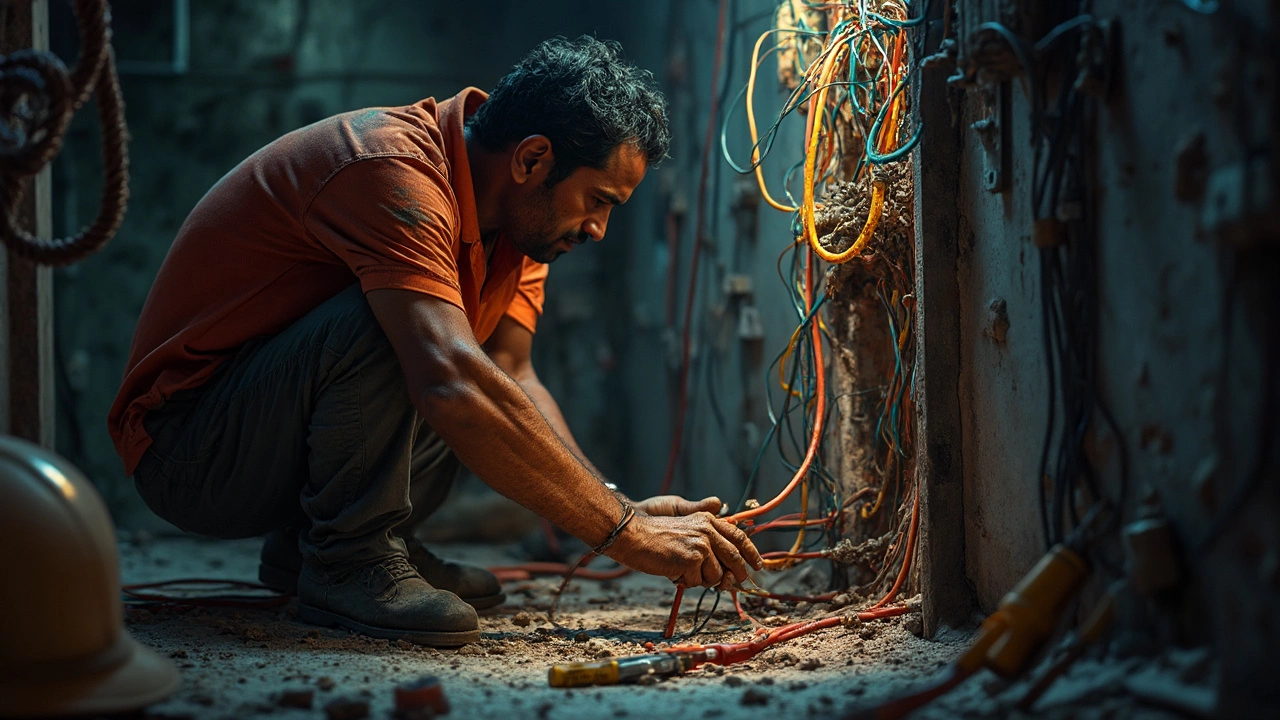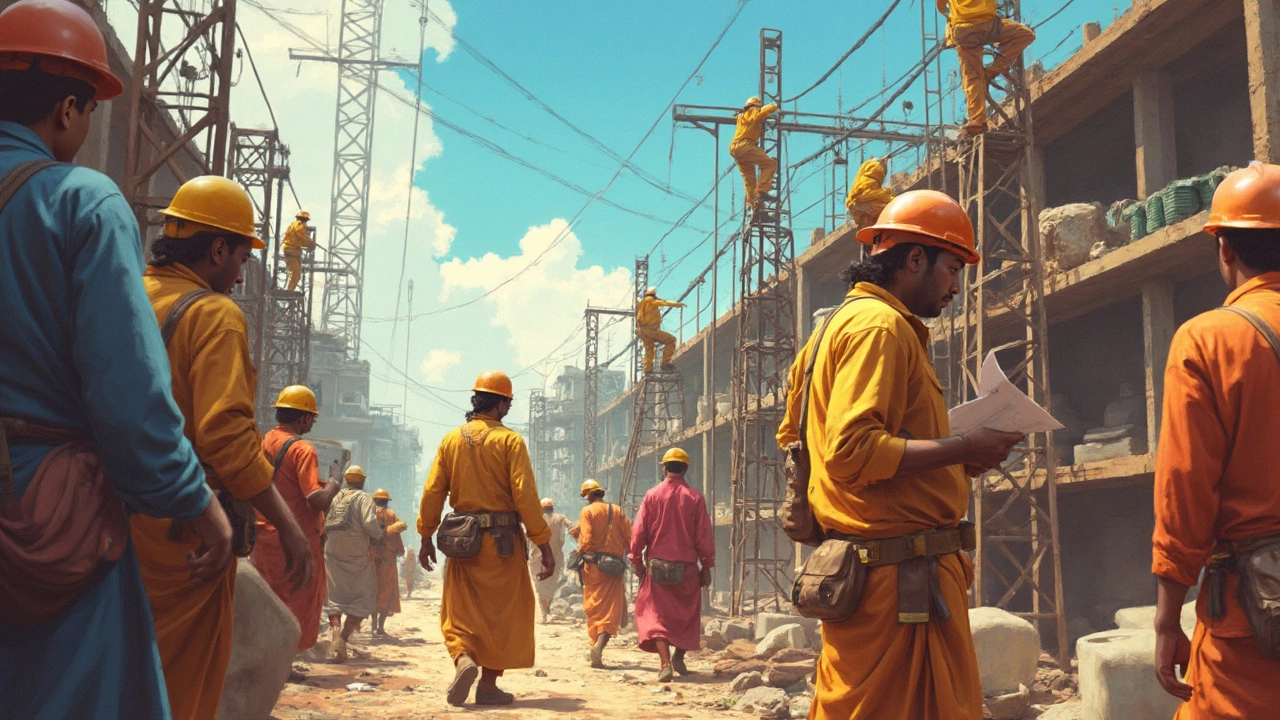Is Becoming an Electrician Tough on the Body?

So, you've got the itch to be an electrician, huh? Not a bad gig at all, with good wages and the satisfaction of fixing things. But let's talk turkey—it's not all sunshine and wires. There's a physical side to this job that you can't ignore.
First off, think about what electricians do daily. They climb ladders, squeeze into tight spots, and hoist heavy stuff. It's like a workout, but with more sparks. Your body works hard, so it's not just mental skill but physical endurance that's key here.
Let’s get real: repetitive strain injuries, sore muscles, and even sprains are part of the package when you're dealing with wires and tools all day. And hey, standing for long periods? Yep, that's part of the deal too. So, if you're considering this line of work, it pays to know how to handle these challenges.
- The Physical Demands of Electrician Work
- Daily Tasks that Challenge the Body
- Health Risks and Safety Concerns
- Tips for Reducing Physical Strain
- Balancing Health and Career Longevity
The Physical Demands of Electrician Work
Being an electrician isn't just about knowing your circuits and cables—it's also about what your body goes through day in and day out. If you're considering diving into this trade, it's crucial to understand the physical challenges that come with it.
Think about it: you're often required to climb ladders, which isn't exactly the same as hitting the gym but definitely works those muscles. Electricians frequently find themselves crawling into cramped, awkward spaces. Your body's flexibility and strength can make a significant difference in how efficiently you perform these tasks.
"The physical aspect of being an electrician can be more demanding than many anticipate. Regularly, my team faces jobs that push their physical limits," says Jamie O’Connor, a veteran electrician with over 20 years in the field.
Depending on the job, you might spend hours on your feet, moving from one spot to another. This requires stamina and a whole lot of resilience. Plus, lifting heavy equipment and materials is par for the course. Having a strong core and good posture can prevent injuries in the long run.
Let's consider some common physical tasks electricians deal with:
- Handling tools: Whether it’s a drill or a pair of pliers, you’re always using your hands, often in repetitive motions that can lead to strain.
- Working overhead: Installing fixtures or running cables may have you looking up for extended periods, which can cause neck strain.
- Maneuvering through tight spaces: Bending, twisting, and sometimes even crawling are all in a day's work, challenging your flexibility and endurance.
All these activities can add up to a decent amount of physical stress, but the good news is there are ways to manage it. Regular exercise, focusing on strength and flexibility, can be hugely beneficial. Stretching before starting work can also help keep your muscles limber and ready to tackle the day.
I mean, why not treat it like a mini workout, right?
Daily Tasks that Challenge the Body
Stepping into the shoes of an electrician isn't just about fiddling with wires and circuits. It's a job drenched in physicality. Let's paint a picture of what a typical day involves and how it can test your physique.
Wake up, grab your tools, and boom—you're on the job. One moment you're standing on a ladder fixing a ceiling light, next thing, you're bending yourself like a pretzel squeezing under the sink for some tight wiring. These are the real daily tasks that can give your body a run for its money.
Reaching, crouching, kneeling—it's all par for the course. Electricians often find themselves working in pretty cramped spaces. Whether it's under a desk or in an attic, the flexibility required is no small thing. It's like being part gymnast, part tightrope walker. A lot of electricians joke that yoga should be part of the training!
According to Mike Holt, a veteran in the industry, "Electricians should think of themselves as athletes. Taking care of your body is just as important as how well you can wire a house."
“Electricians should think of themselves as athletes. Taking care of your body is just as important as how well you can wire a house.” – Mike Holt
Adding to the challenge is the need to carry heavy equipment and materials around. Have you ever tried lugging around a toolbox all day long? That stuff's heavy! And if you're dealing with commercial electrical parts, it could mean even bulkier stuff like conduit pipes.
Here's a quick look at some of the physical activities that fill an electrician's day:
- Climbing ladders and working at heights
- Lifting and moving heavy tools and equipment
- Crouching and crawling in tight spaces
- Standing for long periods during installations
- Bending over in awkward positions
Job safety is always on the radar, but accidents can still strike if you're not careful. A fall from a ladder or an unexpected jolt from live wiring can happen, especially if you're not being mindful. Electricians have one of the higher injury rates, making safety precautions non-negotiable.
In essence, the physical demands of being an electrician are substantial. Your body becomes a vital tool in getting the job done, and it needs the right care and preparation to keep performing at its best. A strong and healthy body makes a stronger electrician.

Health Risks and Safety Concerns
Diving into the world of electricians, you can't skip over the physical demands, which come packed with their own set of health risks. This career isn't just about getting shocked—though that's part of it—but also about how day-to-day work habits can sneak up on you.
First off, there's the risk of electrician health issues from repetitive motion. Bending over to wire sockets or reaching above your head can lead to repetitive strain injuries over time. Your shoulders, wrists, and back are especially vulnerable. It's like when you binge-watch a whole series on TV in one sitting—only you're moving and working.
Then, of course, there's the more immediate stuff: potential for electrical shocks and burns. It’s not just a zap; serious injuries can happen if safety measures aren’t in place. With so much power buzzing around, it’s crucial to stay cautious.
Safety concerns aren't just about what can zap or burn you. Working at heights or in awkward spaces can bring falls or physical accidents. A ladder slip or a trip can end your day (or week) in an entirely unpleasant way.
To keep these risks at bay, it's all about proper safety gear and practices. Wearing the right gloves, helmets, and using tools designed to keep you safe can make a world of difference. Following proper protocols doesn't just make for a safer work environment; it ensures you're around to enjoy the fruits of your labor.
For a quick snapshot, here's a look at some common safety gear:
- Insulated gloves to prevent electrical contact.
- Safety goggles to protect your eyes from debris.
- Hard hats for overhead protection.
- Non-slip boots to prevent falls.
To wrap up, keeping an eye on safety isn't just for Play It Safe posters. Practicing good habits, using proper job safety equipment, and staying aware can help you dodge major problems down the road. And hey, who doesn’t want to go home in one piece?
Tips for Reducing Physical Strain
Taking care of your body is just as important as any other skill you'll learn in electrician training. Sure, sparking up wires is half the job, but avoiding burnout and body strain? That's the other half. So, let’s chat about some real tips to help keep your body in top shape.
First up, warm-ups aren’t just for athletes. Before you start your shift, it’s wise to do some stretching. Pay attention to your back, shoulders, and wrists—these are the parts that work hard during those long hours of electrical work.
Think about your work environment. Is your gear set up correctly? Using ergonomic tools can make a huge difference. Not all screwdrivers and pliers are created equal! If you can, invest in tools designed to reduce strain. They might feel like a small thing, but over time, they can really save your hands and wrists.
- Take breaks regularly. It’s easy to get lost in the work and forget to pause. A few minutes every hour can help refresh your body and mind.
- Switch up tasks when possible to avoid repetitive strain injuries. Movement is key; staying stuck in one position for too long can do a number on your body.
- Don’t skimp on proper lifting techniques. Bend at your knees, not your back, and when in doubt, ask a buddy for a hand. It’s better than tweaking your back pulling wires or moving equipment solo.
Finally, stay hydrated and be mindful of your nutrition. It sounds basic, but when you're on the go, these little things often get overlooked. Proper hydration and a balanced diet keep your energy up, allowing you to focus on your job without unnecessary fatigue.
So, there you have it, a few straightforward ways to ease the physical load of an electrician’s job. Making these part of your routine can really help you avoid aches and keep doing what you love without wearing yourself down.

Balancing Health and Career Longevity
Being in the electrician trade is not just about getting the job done; it's about keeping yourself going for the long haul. Let's face it— a career can be short-lived if you're not mindful of your health. The key is to work smart and take steps to ensure you're not only physically fit but also mentally sharp.
First things first, protecting your body during those physically demanding tasks should be a top priority. Regular stretches and strength training can significantly reduce the risk of injuries. You might not think about it, but building core strength is crucial; it supports your back when you're lugging around heavy gear.
Safety should never take a backseat. Reliable personal protective equipment (PPE) is your best friend. Helmets, gloves, and knee pads—use them religiously. Whether it's working high up on poles or digging trenches, knowing your limits reduces accidents on the job.
Think about nutrition too. Long hours require sustained energy, so ditch the junk food. Opt for balanced meals that give you stamina and help recover muscles. Hydration is also key, even if you're not in sizzling heat. It keeps your senses and muscles on point.
Don't underestimate the power of rest. Proper sleep ensures that you are alert and ready for the challenges each day throws at you. It’s tempting to take every overtime shift for the extra bucks, but chronic fatigue can lead to serious accidents.
Lastly, keep learning. The industry changes, tools evolve, and processes improve. Staying updated keeps you relevant and makes your job easier and safer. Consider courses that teach ergonomic techniques or explore areas like automation, which is becoming a bigger part of the trade.

Post-Comment